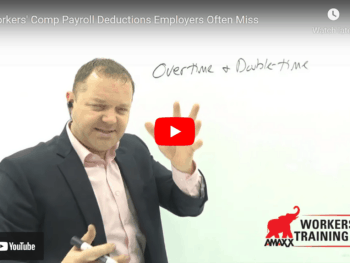Understanding the timing of your application for workers’ compensation insurance is important. Early application saves you the headache of a “fire-drill” in searching for requested information required on a RUSH basis and makes the process smoother for all involved. Large companies with risk managers know this, although can still get caught in last-minute buying situations. Smaller businesses often do not know that it is prudent to get quotes a few weeks at least before their current policy expires or before they open their business.
Generally speaking, because so many policies expire on December 31, year-end is a terribly busy time for underwriters, the people responsible for review of your application and pricing. If you have a December 31 or January 1 expiration or renewal date, begin the process approximately 60 days in advance of the expiration to give the underwriter adequate time to review your application, get acquainted with your account and receive responses to any additional questions. The incumbent carrier should be able to provide a renewal quote 60 days prior to expiration. Be sure to let the carrier or your agent know well in advance you will need the quote 60 days before expiration. Second to year-end, the end of each quarter stands out as a very busy period and the same approach is suggested. If you have control over the expiration, try to choose a date other than these “crunch” times.
The complexity of your account also dictates to a degree the amount of lead-time necessary to underwrite and quote your premium. Simple accounts with smaller to medium employee counts and single or just a couple jurisdictions should take approximately 30 days during a non-busy period. More complex accounts with many jurisdictions and varied exposures with large groups of employees could require a 60-day or longer lead time to underwrite.
Remember, your carrier is your business partner and the better your agent and carrier understand your business, the better they can properly write a policy to cover your exposures. Don’t forget to mention every state you do business in – even if it seems an innocuous situation. If a claim arises, having the proper coverage in place claim payments are simpler and may prevent a lot of headaches. (workersxzcompxzkit)
The lead time isn’t needed only because the underwriters are “busy” but because other people are involved in the process, too. Often a loss control specialist will inspect the property as part of the quoting process and write a report for the underwriter which takes time to schedule and complete. Allow your agent and carrier sufficient time to review thoroughly your application so the proper coverage is in place and your needs are met.
Podcast/Webcast: How To Prevent Fraudulent Workers' Compensation Claims Click Here http://www.workerscompkit.com/gallagher/podcast/Fraudulent_Workers_Compensation_Claims/index.php
WC Books: http://www.reduceyourworkerscomp.com/workers-comp-books-manuals.php
TD Calculator: www.reduceyourworkerscomp.com/transitional-duty-cost-calculator.php
WC Calculator: http://www.reduceyourworkerscomp.com/calculator.php
TD Calculator: www.reduceyourworkerscomp.com/transitional-duty-cost-calculator.php
WC Calculator: http://www.reduceyourworkerscomp.com/calculator.php
Do not use this information without independent verification. All state laws vary. You should consult with your insurance broker or agent about workers' comp issues.
©2009 Amaxx Risk Solutions, Inc. All rights reserved under International Copyright Law. If you would like permission to reprint this material, contact Info@WorkersCompKit.com













